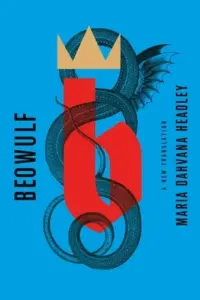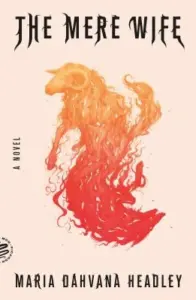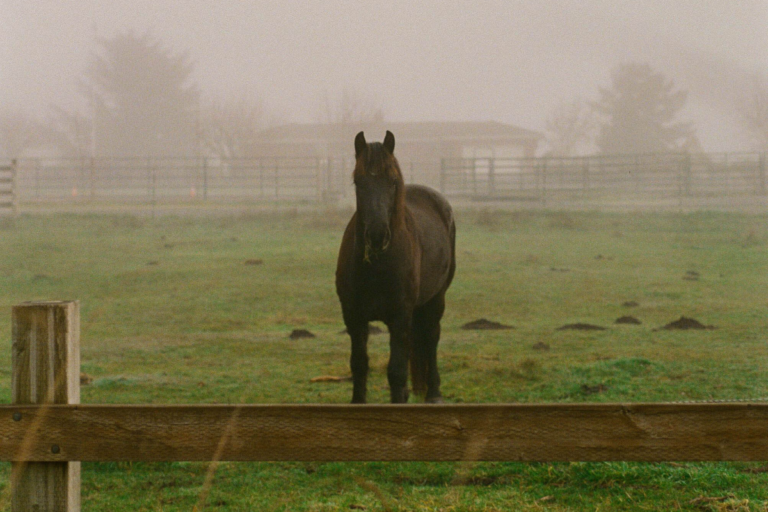Maria Dahvana Headley
Beowulf
Bro — this is definitely not the “Beowulf” that you read back in school. Maria Dahvana Headley’s gutsy, swaggering translation brings the Old English epic poem roaring into this century, showing you why this tale of fraught family ties, power plays and posturing, and mighty, imperfect people is as relevant as ever.
We’re pleased to offer Maria Dahvana Headley’s poem, and invite you to read Pádraig’s weekly Poetry Unbound Substack, read the Poetry Unbound book, or listen back to all our episodes.

Image by Annisa Hale/ Film processed by Moody's Film Lab, © All Rights Reserved.
Guest

Maria Dahvana Headley is the New York Times-bestselling author of eight books, most recently Beowulf: A New Translation (MCD X FSG Originals, 2020). Her novel The Mere Wife (MCD X FSG, 2018), an adaptation of the Beowulf poem set in suburban America, was named by The Washington Post as one of its Notable Works of Fiction in 2018. Her essays on gender, chronic illness, politics, propaganda, and mythology have been published and covered in The New York Times, The Daily Beast, Nieman Storyboard, and elsewhere. She grew up in the high desert of Idaho on a survivalist sled dog ranch, where she spent summers plucking the winter coat from her father’s wolf. Image by Beowulf Sheehan.
Transcript
Transcription by Alletta Cooper
Pádraig Ó Tuama: My name is Pádraig Ó Tuama, and I love ancient mythologies. I love the Epic of Gilgamesh, The Popol Vuh, Inferno. I find the fact that they’re so ancient informing because while circumstances have changed — the internet or tea bag or kettles — what hasn’t changed so often is dynamics of power and exclusion and valor and character. I love the way that old conditions of the human experience have been reoccurring in these texts of ours for so many millennia. And artists and storytellers — whether they could write or not — have been perfecting the psychology, not of perfect characters, but of imperfect characters just like ourselves and just like themselves.
[music: “Praise the Rain” by Gautam Srikishan]
“Beowulf” lines one to 25, translated by Maria Dahvana Headley
“Bro! Tell me we still know how to speak of kings! In the old days,
everyone knew what men were: brave, bold, glory-bound. Only
stories now, but I’ll sound the Spear-Danes’ song, hoarded for hungry times.
“Their first father was a foundling: Scyld Scefing.
He spent his youth fists up, browbeating every barstool-brother,
bonfiring his enemies. That man began in the waves, a baby in a basket,
but he bootstrapped his way into a kingdom, trading loneliness
for luxury. Whether they thought kneeling necessary or no,
everyone from head to tail of the whale-road bent down:
There’s a king, there’s his crown!
That was a good king.
“Later, God sent Scyld a son, a wolf cub,
further proof of manhood. Being God, He knew
how the Spear-Danes had suffered, the misery
they’d mangled through, leaderless, long years of loss,
so the Life-lord, that Almighty Big Boss, birthed them
an Earth-shaker. Beow’s name kissed legions of lips
by the time he was half-grown, but his own father
was still breathing. We all know a boy can’t daddy
until his daddy’s dead. A smart son gives
gifts to his father’s friends in peacetime.
When war woos him, as war will,
he’ll need those troops to follow the leader.
Privilege is the way men prime power,
the world over.”
[music: “Median Point” by Blue Dot Sessions]
So this is the first 25 lines of the great poem, “Beowulf.” That poem is almost 3,200 lines long, so we’re only giving you a short bit. It was written in Old English, and it’s at least a thousand years old. It might’ve been written sometime between the seventh and 10th centuries. And it’s set in what is now Denmark and southern Sweden, and it’s about a warrior, Beowulf. A hero from the land of the Geats, and he crosses the water to the land of the Danes and defeats Grendel, the man-eating monster. And then he defeats that monster’s mother. And 50 years later, another foe arises from his own land, a dragon, and he has to slay the dragon. And spoiler alert, he slays the dragon, but he is also slayed by the dragon.
That’s the almost 3,200-line-long poem of “Beowulf.” It is magnificent and filled with alliteration in its original, as you hear how Maria Dahvana Headley has done so brilliantly in this very recent translation. Right from the start, “brave, bold, glory-bound,” and then “I’ll sound the Spear-Danes’ song, hoarded for hungry times.” “The first father was a foundling.” “Loneliness for luxury.”
Not only is alliteration used, but also compound words. “Whale-road” is used in this section. That’s a way of talking about sea. And that was a way really of introducing certain stresses into the original. Later on, you’ll hear “battle-sweat,” that’s a way of talking about blood. The sun is called a sky candle. It’s not because there wasn’t a word for sun or blood, but because the original poet — nobody knows who the original poet was — wanted to maintain the structure and the form of beats as well as alliteration. I love the way this technology of creating music, creating pulsating rhythm, creating drama through nearby sounds is created in this original poem, and this fantastic translation.
[music: “Milkwood” by Blue Dot Sessions]
There’s this huge question in poetry and literature and kind of in the world of whether translation is ever possible, especially when it comes to artistic renderings of language like poetry or prose. Of course, translation is tried over and over, but each attempt at translation gives birth to something different. Some theories of translation say that a translation is like an offspring of the original text. So the way you might say that a child resembles their parent, but not exactly. Other people think, “No, no. You need to get the original sound and sense as close as possible so that people can feel that.” Other people say, “No, if it was written in a vernacular, bawdy language from a thousand years ago, well then today’s translation needs to be today’s vernacular, bawdy language.” So many people disagree really as to the way to go about translation. That’s the magnificent thing about it. And one of the things that is so interesting about this translation comes to me from a quote that Maria Dahvana Headley has in the translator’s note at the beginning when she says, “My own experiences as a woman tell me it’s very possible to be mistaken for monstrous when one is only doing as men do: providing for and defending oneself.” And that is politically thrilling to read when it comes to a tool and a lens for translation, and a tool and a lens, too, for creating critical, intellectual, alive, electric, playful dialogue.
There’s been a lot of scholarship about the monster Grendel, and then the monster’s mother, who Beowulf also kills. And was the mother a monster, too? Was the mother human therefore was the monster, half human, half monster? And what I love about Maria Dahvana Headley’s translation is that she gives such particular attention to the ways within which female characters are rendered within this text. And she gives such scintillating, brilliant, thrilling translations to the encounter with the monster’s mother. And as such, therefore she’s taking monstrousness seriously as a literary device as well as a character that’s just thrilling and makes the story go on. As well, then, in the history of interpretation and the way that power and gender and the imagination of power and gender and sex is always operating, whether in fiction or in fact or in forensic truth or in literary truth.
[music: “Morning Glare” by Blue Dot Sessions]
Maria Dahvana Headley translates the opening word as “bro” which is hilarious and so clever and insightful. In the original language, in Old English, it’s “Hwæt,” which might translate, I suppose — I’m only taking this from great scholars — something like “lo” or “harken” or “listen” or “behold,” something that’s calling for attention. And Seamus Heaney translated this opening word as “so,” which in a certain sense is a bit gentler, but it’s also saying, “so that’s in the past. I’m taking authority now.” And Maria Dehvana Headley uses the word “bro,” and it sounds like Seamus Heaney’s “so,” but it does something different. Because what it can be — “bro” — is it can be a code word between men who are recognizing other men, whether affectionately, whether kind of awkwardly because they’ve forgotten each other’s name or because they want some kind of a brawl or all kinds of other ways, but it can be a code word. And by using “Hwæt” and translating that into English as “bro” Maria Dahvana Headley is giving us an insight into terms of the dynamics of power that she’s exploring — how you treat the other men in your warrior troop, or how you treat the king or the leader or the throne bearer of the neighboring kingdom, or how it is you bring yourself with great valor to the battle. But by using “bro” as the opening line, what she’s doing is saying, “There’s other levels of power, too,” that she’s bringing to the surface levels of coding of power and showing what language can hold by what language says as well as by what language omits.
[music: “Median Point” by Blue Dot Sessions]
There’s a great mythology of masculinity in this poem. The way that Maria Dahvana Headley translates it as “God sent Scyld a son, a wolf cub, / further proof of manhood.” And that brings in this really important theme that you find the whole way throughout “Beowulf,” which is a theme of the kind of heroic code, the warrior code, the kingly code, and succession as well. Someone who knows how to succeed an ancestor. “We all know a boy can’t daddy / until his daddy’s dead,” and then, right after that, “A smart son gives / gifts to his father’s friends in peacetime.” So to build up favor in an account. This is showing what it means to be battle-wise, to know, to prepare yourself for battle, even during times of peace, to find a way to mollify, perhaps, internal family tensions that might happen between a father and a son; a king and a prince; somebody who is going to succeed the one who is currently on the throne. It’s a fascinating topic, questions about what does it mean to succeed after somebody where you are hoping that their mantle, their power, their role, their throne, perhaps, will pass on to you.
The way that this first 25 lines finishes is, “Privileges the way men prime power, / the world over.” And that’s what I think is brilliant about this opening translation. Maria Dahvana Headley is taking the heroic code and highlighting it not just in terms of behavior but exclusion as well. The leaders that are all imagined and represented in this text are men. She’s not trying to make the ancient texts of this perfect. She’s saying, “Here’s its limitations.” She highlights that from the way she translates the first word. She doesn’t do that to decimate the text. She does it to say, “Let’s exemplify it. Let’s look at it. Let’s look at it in conversation with today, and look at the imperfections of ourselves today as well, and create a critical dialogue between this brilliant, limited ancient poem and this brilliant, limited contemporary self.”
[music: “Invernen” by Blue Dot Sessions]
Beowulf, lines one to 25, translated by Maria Dahvana Headley
“Bro! Tell me we still know how to speak of kings! In the old days,
everyone knew what men were: brave, bold, glory-bound. Only
stories now, but I’ll sound the Spear-Danes’ song, hoarded for hungry times.
“Their first father was a foundling: Scyld Scefing.
He spent his youth fists up, browbeating every barstool-brother,
bonfiring his enemies. That man began in the waves, a baby in a basket,
but he bootstrapped his way into a kingdom, trading loneliness
for luxury. Whether they thought kneeling necessary or no,
everyone from head to tail of the whale-road bent down:
There’s a king, there’s his crown!
That was a good king.
“Later, God sent Scyld a son, a wolf cub,
further proof of manhood. Being God, He knew
how the Spear-Danes had suffered, the misery
they’d mangled through, leaderless, long years of loss,
so the Life-lord, that Almighty Big Boss, birthed them
an Earth-shaker. Beow’s name kissed legions of lips
by the time he was half-grown, but his own father
was still breathing. We all know a boy can’t daddy
until his daddy’s dead. A smart son gives
gifts to his father’s friends in peacetime.
When war woos him, as war will,
he’ll need those troops to follow the leader.
Privilege is the way men prime power,
the world over.”
[music: “Praise the Rain” by Gautam Srikishan]
Chris Heagle: “Beowulf” lines one through 25 comes from Beowulf: A New Translation by Maria Dahvana Headley. Thank you to Farrar, Straus and Giroux and Scribe Publications who gave us permission to use Maria’s translation. Read it on our website at onbeing.org.
[music: “Praise the Rain” by Gautam Srikishan]
Poetry Unbound is: Gautam Srikishan, Eddie Gonzalez, Lilian Vo, Lucas Johnson, Amy Chatelaine, Kayla Edwards, Annisa Hale, and me, Chris Heagle.
Our music is composed and provided by Gautam Srikishan and Blue Dot Sessions.
This podcast is produced by On Being Studios, which is located on Dakota land. Open your world to poetry with us by subscribing to our Substack newsletter. You may also enjoy Pádraig’s book, Poetry Unbound: Fifty Poems to Open Your World. For links and to find out more visit poetryunbound.org.
Books & Music
Recommended Reading
The On Being Project is an affiliate partner of Bookshop.org and Amazon.com. Any earnings we receive through these affiliate partnerships go into directly supporting The On Being Project.













Reflections